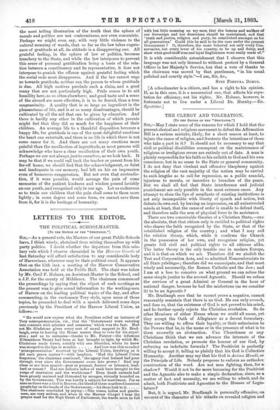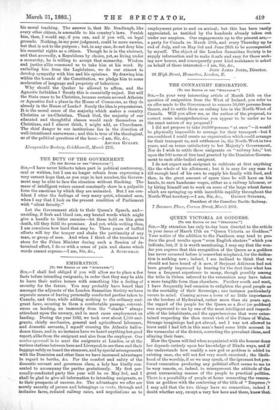THE CLERGY AND TOLERATION.
[TO THE EDITOR OF THE "SPECTATOR."]
Sm,—May I state some of the reasons for which I hold that the- present clerical and religious movement to defeat the Affirmation
Bill is a serious mistake, likely, for a short season at least, to, injure the cause of religion, and frustrate the intentions of those- who take a part in it ? It should not be necessary to say that civil or political disabilities consequent on the maintenance of' religious or irreligious errors are entirely out of da,te. A man is plainly responsible for his faith or. his unfaith to God and his own conscience, but in no sense to the State or general community. I do not deny that virulent and offensive blasphemy against the religion of the vast majority of the nation may be carried
to such lengths as to call for repression, as a public scandal,. injurious to morals, or incentive to breaches of the peace.
But we shall all feel that State interference and judicial punishment are only possible in the most extreme cases. Any attempt to close the lips of assailants of existing institutions is not only incompatible with liberty of speech and action, but defeats its own end, by leaving an impression, on all uninstructed minds at least, that the cause of order is unable to defend itself, and therefore calls the arm of physical force to its assistance.
There are two conceivable theories of a Christian State,—one the absolute, that that citizen only is entitled to political rights who shares the faith recognised by the State, or that of the- established religion of the country ; and what I may call the relative theory, which, while it confirms the Church in the possession of her own, and recognises religion, yet grants full civil and political rights to all citizens alike.
The latter theory is the only tenable one in modern Enrope, and it is that on which we act. Therefore did we abolish the- Test and Corporation Acts, and so admitted Nonconformists to- all State privileges; therefore did we emancipate, and that most wisely and necessarily, the Roman Catholic and the Jew; and
I am at a loss to conceive on what ground we can refuse the- same simple justice to the avowed Agnostic. Should we refuse the services of a great Admiral or General in the hour of. national danger, because he had the misfortune (as we consider it) to be an Agnostic ?
Mr. Bracllaugh sees that he cannot prove a negative, cannot, reasonably maintain that there is no God. He can only avouch,
and does so, that the existence of God is not proved to his mind, and he further openly rejects the Christian revelation. So do other Members of either House whom we could all name, yet.
they accept the Oath of Allegiance as a decent formulary.
They are willing to affirm their loyalty, or their submission to- the Powers that be, in the name or in the presence of what is to- theni avowedly an abstraction. Can Churchmen or any Christians think that we can advance the interests of the. Christian revelation, or promote the honour of our God, by enforcing an indefinite formula ? The Positivist is perfectly willing to accept it, telling us plainly that his God is Collective Humanity. Another may say that his God is Anima llfundi, or the Principle of Life. Nobody proposes to enforce an orthodox construction of the word. Are not men fighting, then, for a. shadow? Would it not be far more becoming for the Positivist and the Agnostic also to make a simple declaration, since, as a matter of fact and necessity, we are willing to admit, and do admit, both Positivists and Agnostics to the Houses of Legis- lature P But, it is argued, Mr. Bradlaugh is personally offensive, on account of the character of his attacks on revealed religion and
his moral teaching. The answer is, that Mr. Bradlaugh, like every other citizen, is amenable to his country's laws. Punish him, then, I would say, if you can, and if you will, on legal grounds. Nothing, in my poor judgment, could be more unwise, but that is not to the purpose ; but, in any case, do not deny him his essential rights as a citizen. Though he is in the abstract, and that avowedly, a Republican by choice, yet, as living under a monarchy, he is willing to accept that monarchy. Wisdom and justice alike command us to take him at his word. By excluding him from the Legislature, we do our utmost to ,develop sympathy with him and his opinions. By drawing him within the bounds of the Constitution, we pledge him to some moderation of language and propriety of behaviour.
Why should the Quaker be allowed to affirm, and the Agnostic forbidden P Surely this is essentially unjust. But will the State cease to be Christian, because certain avowed Atheists -or Agnostics find a place in the House of Commons, as they do -already in the House of Lords P Surely the ideals preposterous. It is the moral sense of the majority which makes a country Christian or Un-Christian. Thank God, the majority of our -educated and thoughtful classes would rank themselves as Christians, and I almost think, I might add, as Churchmen. The chief danger to our institutions lies in the direction of well-intentioned narrowness ; and this is true of the theological, -as of the political questions of the hour.—I am, Sir, &c.,



































 Previous page
Previous page